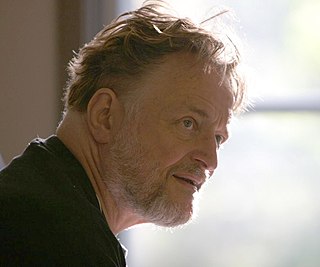
John Horton Conway was an English mathematician active in the theory of finite groups, knot theory, number theory, combinatorial game theory and coding theory. He also made contributions to many branches of recreational mathematics, most notably the invention of the cellular automaton called the Game of Life.

In mathematics, a permutation group is a group G whose elements are permutations of a given set M and whose group operation is the composition of permutations in G (which are thought of as bijective functions from the set M to itself). The group of all permutations of a set M is the symmetric group of M, often written as Sym(M). The term permutation group thus means a subgroup of the symmetric group. If M = {1, 2, ..., n} then Sym(M) is usually denoted by Sn, and may be called the symmetric group on n letters.
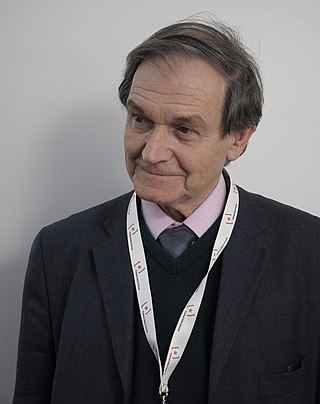
Sir Roger Penrose is an English mathematician, mathematical physicist, philosopher of science and Nobel Laureate in Physics. He is Emeritus Rouse Ball Professor of Mathematics in the University of Oxford, an emeritus fellow of Wadham College, Oxford, and an honorary fellow of St John's College, Cambridge, and University College London.

In abstract algebra, group theory studies the algebraic structures known as groups. The concept of a group is central to abstract algebra: other well-known algebraic structures, such as rings, fields, and vector spaces, can all be seen as groups endowed with additional operations and axioms. Groups recur throughout mathematics, and the methods of group theory have influenced many parts of algebra. Linear algebraic groups and Lie groups are two branches of group theory that have experienced advances and have become subject areas in their own right.
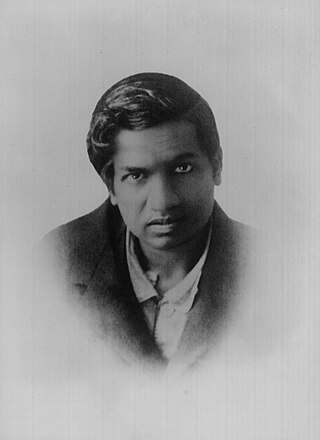
Srinivasa Ramanujan was an Indian mathematician. Though he had almost no formal training in pure mathematics, he made substantial contributions to mathematical analysis, number theory, infinite series, and continued fractions, including solutions to mathematical problems then considered unsolvable.
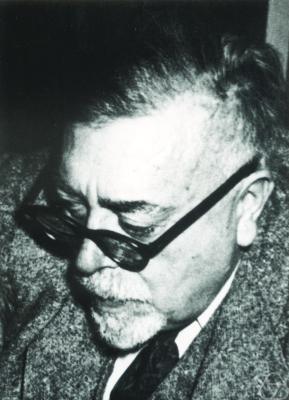
Norbert Wiener was an American computer scientist, mathematician and philosopher. He became a professor of mathematics at the Massachusetts Institute of Technology (MIT). A child prodigy, Wiener later became an early researcher in stochastic and mathematical noise processes, contributing work relevant to electronic engineering, electronic communication, and control systems.

In group theory, the wreath product is a special combination of two groups based on the semidirect product. It is formed by the action of one group on many copies of another group, somewhat analogous to exponentiation. Wreath products are used in the classification of permutation groups and also provide a way of constructing interesting examples of groups.

Dragan Marušič is a Slovene mathematician. Marušič obtained his BSc in technical mathematics from the University of Ljubljana in 1976, and his PhD from the University of Reading in 1981 under the supervision of Crispin Nash-Williams.

The University of Leeds is a public research university in Leeds, West Yorkshire, England. It was established in 1874 as the Yorkshire College of Science. In 1884 it merged with the Leeds School of Medicine and was renamed Yorkshire College. It became part of the federal Victoria University in 1887, joining Owens College and University College Liverpool. In 1904 a royal charter was granted to the University of Leeds by King Edward VII.

In mathematics, a cyclic order is a way to arrange a set of objects in a circle. Unlike most structures in order theory, a cyclic order is not modeled as a binary relation, such as "a < b". One does not say that east is "more clockwise" than west. Instead, a cyclic order is defined as a ternary relation [a, b, c], meaning "after a, one reaches b before c". For example, [June, October, February], but not [June, February, October], cf. picture. A ternary relation is called a cyclic order if it is cyclic, asymmetric, transitive, and connected. Dropping the "connected" requirement results in a partial cyclic order.
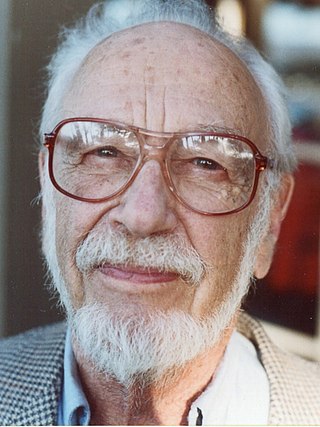
David Gale was an American mathematician and economist. He was a professor emeritus at the University of California, Berkeley, affiliated with the departments of mathematics, economics, and industrial engineering and operations research. He has contributed to the fields of mathematical economics, game theory, and convex analysis.

Leon Mestel was an Australian astronomer and astrophysicist and Emeritus Professor at the University of Sussex. His research interests were in the areas of star formation and structure, especially stellar magnetism and astrophysical magnetohydrodynamics. He was awarded both the Eddington Medal (1993) and the Gold Medal of the Royal Astronomical Society. Following his retirement, he wrote several obituaries and biographical articles on physicists and astrophysicists.
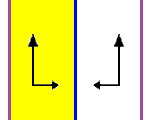
In mathematics, the infinite dihedral group Dih∞ is an infinite group with properties analogous to those of the finite dihedral groups.
The Berwick Prize and Senior Berwick Prize are two prizes of the London Mathematical Society awarded in alternating years in memory of William Edward Hodgson Berwick, a previous Vice-President of the LMS. Berwick left some money to be given to the society to establish two prizes. His widow Daisy May Berwick gave the society the money and the society established the prizes, with the first Senior Berwick Prize being presented in 1946 and the first Junior Berwick Prize the following year. The prizes are awarded "in recognition of an outstanding piece of mathematical research ... published by the Society" in the eight years before the year of the award.

Infinity is something which is boundless, endless, or larger than any natural number. It is often denoted by the infinity symbol .
In the mathematical field of order theory, an order isomorphism is a special kind of monotone function that constitutes a suitable notion of isomorphism for partially ordered sets (posets). Whenever two posets are order isomorphic, they can be considered to be "essentially the same" in the sense that either of the orders can be obtained from the other just by renaming of elements. Two strictly weaker notions that relate to order isomorphisms are order embeddings and Galois connections.
In mathematical logic, an omega-categorical theory is a theory that has exactly one countably infinite model up to isomorphism. Omega-categoricity is the special case κ = = ω of κ-categoricity, and omega-categorical theories are also referred to as ω-categorical. The notion is most important for countable first-order theories.

Helmut Wielandt was a German mathematician who worked on permutation groups.

Laurentius Petrus Dignus "Lou" van den Dries is a Dutch mathematician working in model theory. He is a professor emeritus of mathematics at the University of Illinois at Urbana–Champaign.
John Kenneth Truss is a mathematician and emeritus professor of pure mathematics at the University of Leeds where he specialises in mathematical logic, infinite permutation groups, homogeneous structures and model theory. Truss began his career as a junior research fellow at the University of Oxford before holding a series of academic positions and lastly joining the University of Leeds. He has written books on discrete mathematics (1991) and mathematical analysis (1997) and was co-editor in chief of the Journal of the London Mathematical Society until June 2003. He is the father of the former Prime Minister of the United Kingdom, Liz Truss.














